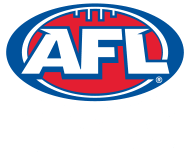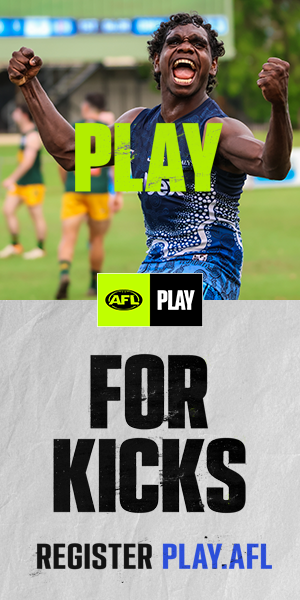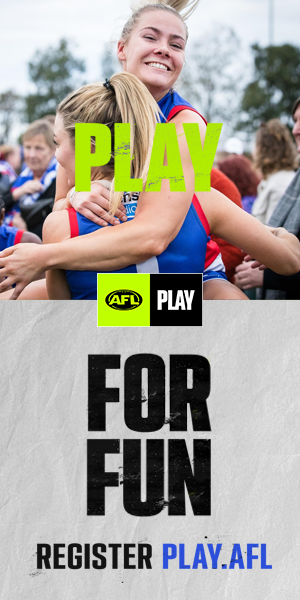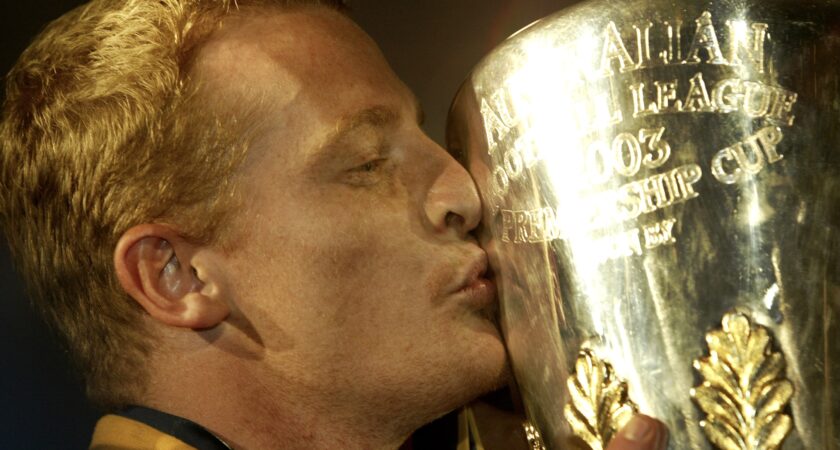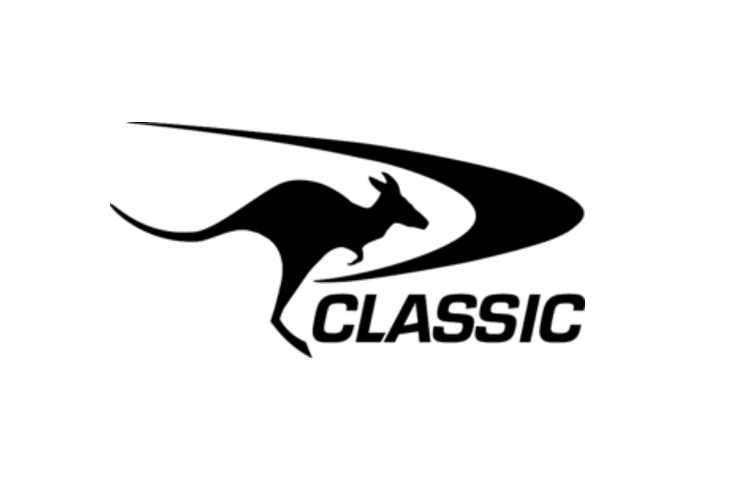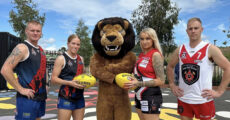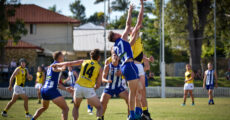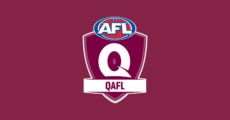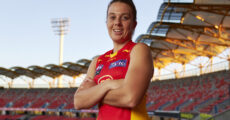Submitted by Peter Blucher.
Amid numerous AFL grand final highlights in the Queensland football archives it is difficult to go past one as the very best …. the Brisbane Lions’ 2003 premiership.
While there are others that individually are special, this was a collective highlight of the highest order when no less than seven Queenslanders figured in the fairytale win that secured the Lions’ premiership hat-trick.
Captain Michael Voss, Jason Akermanis, Marcus Ashcroft, Jamie Charman, Robert Copeland, Clark Keating and Mal Michael. Almost a third of the side that stamped itself as arguably the greatest test in AFL history, certainly one of the very best, had learned their football at junior clubs in and around Brisbane.
With combined links to local clubs Morningside, Mayne, Surfers Paradise, Southport, Sandgate, Zillmere/Northern Eagles, Strathpine and Kenmore, they are an extraordinary collective proof of the success of an ongoing campaign to expand and develop Queensland football.
Seven Queenslanders in one grand final team? It is as many Queenslanders who played in the entire AFL competition in 28 years from 1948, when ex-Kedron centre half back Erwin Dornau was the first at South Melbourne, and a momentous feature on an ever-increasing rise.
By the end of 1979 a total of 13 Queenslanders had played at the highest level. Through the 1980’s there were 23 more, followed by 32 in the 90’s, 51 in the 2000’s and 63 in the decade starting with 2010. With nine more in the last two years the grand total stands at 191.
But the 2003 grand final wasn’t just a numeric thing. It was as much about quality and key planks in football history too.
Voss, one of the game’s all-time great players and captains, Akermanis, like Voss a Brownlow Medallist, Ashcroft, Queensland games record-holder at 318, Jamie Charman, a Maryborough-born State swimmer recruited from a famous rugby school, Copeland, the first Queensland rookie to win a flag, Keating, another rugby convert who became known as ‘Mr September’ so good was he at finals time, and Michael, the first rookie in AFL history to play League football.
Collectively they boast 18 AFL premierships. Yes, that qualifies as the highlight of highlights in Queensland football’s grand final history.
Individually, it’s harder to single out special grand final performances, but Voss and Hawthorn champion Jason Dunstall, captain and vice-captain of the Queensland Team of the Century, are right up there. So, too, Brownlow Medallist Jason Akermanis.
Voss the Boss
While no Queenslander has won a Norm Smith Medal, Voss should have. Indeed, had voting in the medal in the 2002 grand final not been done midway through the final quarter the triple premiership captain may well have taken the ‘Norm’ that went to Collingwood counterpart Nathan Buckley.
Voss had five crucial possessions in the last minutes of the water-logged nail-biter, eventually decided by Akermanis’ left foot snap, and was the difference.
But they were five possessions that were not taken into consideration in medal voting in which Buckley (12) won from teammate Anthony Rocca (8) and the Brisbane trio of Lappin (5), Voss (4) and Simon Black (1).
Indeed, in the days following the grand final the AFL decided to change the system to allow all voting to be done after the final siren in future after three of five judges revealed they would have voted differently had they been given more time.
AFL columnist Robert Walls, then ABC commentator Dwayne Russell and Perth journalist Mark Duffield – none of which had Voss in their votes – all said they would have included him if they voted after the final siren.
Still, the champion midfielder, whose match statistics of 26 possessions (10 contested), six tackles, an all-time GF record 12 forward 50 entries and three clearances didn’t quite do him justice, went home with the medal he wanted. And the satisfaction of a job he could barely have done better.
Voss shared top billing in the Lions best & fairest voting in the 2002 grand final with teammate Nigel Lappin. And across the three grand finals of 2001-02-03 who was voted the Lions best player by the coaching staff?
It was a tie between Voss and Lappin (10 votes) from Simon Black and Shaun Hart (9.5) ranked equal third from Alastair Lynch (9), Jonathan Brown, Chris Johnson, Clark Keating, Mal Michael and Luke Power (8), Justin Leppitsch (7.5) and Jason Akermanis (7).
The Chief
Dunstall, who played in a Queensland record five grand finals for four premierships, statistically at least had his best game in 1988 when he kicked seven goals in a thumping 96-point win over Melbourne by 96 points, which ranks equal fourth behind Gary Ablett Snr (9 in 1989), Gordon Coventry (9 in 1928) and Dermott Brereton (8 in 1985).
The Norm Smith Medal went to Hawks defender Gary Ayres, who had 22 possessions despite suffering a fractured cheek bone in the first quarter, and the Hawthorn brainstrust voted Paul Abbott best from Ayres, Brereton and Dunstall.
But if anything, Dunstall’s performance against Carlton in the 1986 grand final was better. After Hawthorn had led by 21 points at halftime be kicked three of six goals in a 7-1 to 2-2 third quarter which put the game beyond doubt.
It was a game-high half dozen, and he kicked 6-0, but medal again went to Ayres, this time playing on the wing. The Hawks voted Ayres, Gary Buckenara and Dunstall.
The champion Queenslander, now a multi-media star who goes by the nickname ‘Chief’, was in the Norm Smith Medal mix again in 1989, when Hawthorn beat Geelong 21-18 (144) to 21-12 (138) in possibly the best grand final all-time. But this time the medal went to Gary Ablett Snr on the losing side.
Dunstall kicked an equal game-high four goals and was rated fifth best by the Hawks brainstrust behind Dean Anderson, Buckenara, Peter Curran and Robert Dipierdomenico.
In 1991 ‘Chief’ also kicked six goals in the win over West Coast at Waverley but didn’t feature among contenders for the medal won by teammate Paul Dear.
Now, 30 years since his last grand final outing, Dunstall ranks equal third all-time in grand finals with 23/. He is level with Melbourne’s Jack Mueller, who played six grand finals in the 1930s and ‘40s, and behind long-time teammate Dermott Brereton, who kicked 25 goals in eight grand finals, and Collingwood legend Gordon Coventry, who kicked 35 goals in 10 grand finals in the 1920s and ‘30s.
Among the 15 players who have kicked 15 or more grand final goals, Dunstall’s goals per GF average of 4.6 is #1 from Richmond 1930s-40s star Dick Harris (4.5) and Collingwood 1930’s star Ron Todd (4.3) and Carlton captain of the 1990s Stephen Kernahan (4.3).
Aker-mania
While Akermanis’ best-known grand final moment was the match-winning goal in 2002, his most complete grand final performance came in the 2003 against Collingwood when he had 20 possessions and kicked five goals.
A fast, open game that was over by halftime suited the mercurial tearaway, who turned the screws on a hapless Magpies outfit with blistering display as teammate Simon Black collected a grand final record 39 possessions to win the Norm Smith Medal in a unanimous landslide.
In Lions B&F voting, Black (4.5) was ranked best from Akermanis, Alastair Lynch and Mal Michael (4).
Just Plain Crackers!
Clark Keating didn’t get the nickname ‘Mr September’ for nothing. He was a finals specialist who, when everything was on the line, just got the job done. As the numbers indicate.
Across the Lions 2001-02-03 premiership seasons 23 players played 44 or more games. Simon Black played all 76 to rank first, from Marcus Ashcroft 75, Michael Voss, Mal Michael and Martin Pike 72, and Jason Akermanis played 71. And at the bottom end of this group, Keating played 44.
But in finals over the same period Keating ranked equal first. He was one of 12 Lions to play all 10 finals in this period, joining Akermanis, Black, Jonathan Brown, Shaun Hart, Chris Johnson, Justin Leppitsch, Michael, Pike, Voss and Darryl White with a perfect September record.
His aggressive thump forward from the centre bounce became a September trademark as provided wonderful service to the brilliant Lions midfield.
All while Keating enormous finals ranking is more an overall one, his 39 hit-outs in the 2002 grand final was an all-time AFL record at the time, surpassing Justin Madden’s 38 for Carlton in 1986.
And 19 years on Keating’s superb performance still ranks fourth overall behind Brodie Grundy’s 49 hit-outs for Collingwood in 2018, Sam Jacobs’ 49 hit-outs for Adelaide in 2017 and Aaron Sandilands’ 44 hit-outs for Fremantle in 2013. And Grundy, Jacobs and Sandilands all finished on the losing side.
OTHER GRAND FINAL STORIES
Invariably every AFL grand final tosses up a bunch of great personal stories. Some mind-blowingly good and some heart-breaking. Voss, Dunstall, Akermanis and Keating aside, there are 22 other Queenslanders who have played in an AFL grand final. Here’s their GF snapshot.
The Perfect Exit
It was the perfect way to go out. Marcus Ashcroft, a Lions premiership player in 2001-02, played in his third consecutive premiership side two days beyond his 32nd birthday in 2003 and hung up the boots. It was 318 games, a Queensland record at the time, and out.
Ashcroft is one of just four 300-gamers in AFL history to go out on a premiership. Among a total 89 players in League history to have completed a career of 300 games he is the odd man out in a group with Hawthorn trio of Russell Greene (1988), Michael Tuck (1991) and Shane Crawford (2005).
It was a fitting reward, too, for a player who had done the hard yards through the early days of the Bears/Lions. He was part of a team that had won three wooden-spoons before his first taste of finals football, and five years into his career he’d played 82 games for just 17 wins and one draw.
The First Rookie
Without suggesting the 2003 flag was anything less than exhilaration-plus, the unforgettable moment in Robert Copeland’s career was the Lions’ 2001 flag. It completed a career start as good as was Marcus Ashcroft’s career end.
Copeland had started the 2001 season on the rookie list. He got a late call-up to play his first game in senior company in the 2001 Ansett Cup pre-season grand final against Port Adelaide in Adelaide when captain Michael Voss was injured.
It was something of a false start. They were belted 3-8 (26) to 17-9 (111) and Copeland went back to being just another rookie.
But on 10 May he was elevated the senior list to replace the injured Mick Martin, and made his debut on his 20th birthday in the Round 9 Gabba clash with Adelaide, which had followed a diabolical 74-point loss to Carlton in Round 8.
The post-script to the Carlton loss was the turning point in the season. And the club.
After a no-holds-barred review with coach Leigh Matthews in the dressing rooms immediately after the Carlton fiasco the Lions were a different side. And although they lost narrowly to Adelaide in Copeland’s debut they beat premiers Essendon in the famous ‘if it bleeds we can kill it” game in Round 10 and were not beaten again that season.
By the time Copeland walked off the MCG after the grand final he’d played 17 games for 16 wins. He was the first Queensland rookie to graduate to a flag, and at 20 years 127 days he was and still is the youngest Queenslander to play in and win a grand final.
Quickest to a Flag
Robert Copeland was 17 games into his first AFL premiership in 2001, but in comparison to two other Queenslanders he was an absolute veteran. Aaron Keating tasted the ultimate football triumph in just his third game in 1997, and Brent Renouf likewise in his eighth game in 2008.
Keating, the older brother of Lions’ triple premiership ruckman Clark Keating, won a flag with a Crows in just his third game. Only eight players have done so in fewer games.
Originally from Surfers Paradise Football Club, he moved to the SANFL and played six senior games with South Adelaide in 1994-95 and 46 games with Norwood from 1996-2000.
Tied to Port Adelaide, he was traded to Crows at the end of the ’96 season and debuted against Brisbane and his brother in Round 1 at Football Park, when a shoulder injury sentenced him to a long stint on the sideline.
But when David Pittman was suspended for the preliminary final coach Malcolm Blight made the brave call to play Keating in partnership with Shaun Rehn in the ruck. Then, when Tony Modra was ruled unfit for the grand final Keating held his spot. And then he played in Norwood’s SANFL premiership the following week. Three more games in 1998 and his AFL career was done.
Renouf, a member of the star-studded Queensland Under 18 side coached by Craig McRae in 2006, joined Hawthorn via selection #24 in the National Draft and debuted in Round 12 2008. Born in New Zealand but a product of Southport, he played Rounds 12-13-14 before losing his spot due to suspension.
He was recalled for the last two games of the home-and-away season and then played three finals, culminating in the Hawks’ 26-point win over Geelong in just his eighth game. He went on to play 52 games at Hawthorn 2008-11 and 16 games at Port Adelaide 2012-14.
Recruiting Perfection
After finals campaigns that came up short in 1999-2000 Lions coach Leigh Matthews went on a very specific recruiting campaign. After the retirement of long-time fullback Richard Champion he needed a replacement. And he found one at Collingwood. A Queenslander no less.
Mal Michael, a Kenmore junior who had played seniors at Morningside before he was recruited by the Magpies, already had a place in football as the first ex-rookie to play at the highest level. And at Matthews’ behest he returned ‘home’ in 2001 to become a key plank in one of the best sides of all-time.
Michael slipped into the defensive goal square wearing the #15 jumper and formed with centre half back Justin Leppitsch a key defensive pairing that played a key role in the 2001-02-03 premierships. It was the highlight of a 238-game career that ended with two seasons at Essendon after he had ‘retired’ only to make an unexpected comeback.
Payback Personified
Jamie Charman was flying through the 2002 AFL season. With one of and sometimes both of Clark Keating and Beau McDonald injured for much of the year, Charman played 20 home-and-away games and the first final after missing the season-opener. But in a gut-wrenching blow he missed selection for the preliminary final and grand final when Keating and McDonald were both fit.
It was a bitter pill for the bouncy then-20-year-old, but he handled the setback with such aplomb that captain Michael Voss was moved to praise him on club champion night for his team-first approach throughout the finals.
He got his reward in 2003 when he played every game in a 26-match campaign, joining Keating in a lethal two-pronged ruck division in the big grand final win over Collingwood.
A Record Queensland Haul
If you were asked ‘which Queenslander has had most possessions in an AFL grand final?” and you didn’t know it would take a lot of guessing. It’s an honour shared between two players. Michael Voss had 26 possessions in 2002 to be the easy pick, but more obscure was Michael Osborne in 2008.
It was only one short of a career-best for the ex-Labrador utility, who became the second Queensland rookie to win an AFL flag when he was also a part of the 2008 Hawks premiership. But unlike Robert Copeland he’d had a long, tough road.
Drafted as a rookie at the end of the 2000 season, he played the last two games of 2001 and one game in mid-2002 before being de-listed. It was only after he was given a second chance as a rookie that his career started to flourish.
He was a regular when fit thereafter, and in 2008 he played 20 of 22 home-and-away games and three finals, collecting 26 possessions in his 99th game in the grand final. At the time it was a career- best, and when he retired five years and 69 games later he’d only gone past 26 once – he had 27 one day.
Osborne, fifth in the Hawthorn best & fairest in the 2008 premiership year, missed much of 2012 due to a knee reconstruction and retired at the end of 2003 and later served as a development coach at Carlton.
The Quiet Achiever
David Hale has snuck under the Queensland radar a little, but his AFL grand final record is as good as most. Born in Tasmania but a Gold Coaster before his first birthday and a product of Coolangatta via Broadbeach, he played in four grand finals for three flags.
The Hale story, which peaked at Hawthorn after he started his career at North Melbourne, is like the Lions in reverse. A loss in the 2012 grand final before consecutive flags in 2013-14-15 in the last three years of a 237-game career in which joined the rare group of players with 100+ games at two clubs.
Acting senior coach at Fremantle for one game in 2019 after Ross Lyon was sacked, he has recently returned to the Hawthorn coaching staff under Sam Mitchell after a long stint with the Dockers.
Second Time Lucky
Dayne Beams was the third Queenslander to win an AFL flag before his 21st birthday in 2010 after Robert Copeland and Brent Renouf – but it took two goes. There was the drawn grand final in the customary last Saturday in September and the replay the following week.
After shunning approaches from the Gold Coast Suns ahead of their to the AFL entry I 2011 because it would have required a two-year wait, the ex-Southport midfielder played in a preliminary final in his first season and two-part grand final against St.Kilda in 2010 in his 42nd and 43rd games
.
Third Time Unlucky
St.Kilda pair Nick Riewoldt and Sam Gilbert weren’t so lucky. They were on the wrong end of the two-part grand final against Collingwood in 2010 after having already suffered the heartbreak of a loss in the ‘big one’ in 2009.
Riewoldt and Gilbert, both drafted from Southport, will never escape the emptiness of what has become known as ‘the Stephen Milne bounce” when the Sherrin took an extraordinary off-break bounce in the first grand of 2010 to cost the Saints a flag.
In the closing seconds Lenny Hayes kicked long to full forward, where Milne was one-out with Collingwood’s Ben Johnson. He worked Johnson under the ball and ran back to it, seemingly set to gather and kick an easy goal to put the Saints up.
But just as he closed on the ball it took a huge bounce right and through for a behind that locked up the scores. And in the two and a half minutes that followed neither side could break the deadlock, prompting just the second grand final replay in AFL history.
The First Queensland Premiership Player
Who was the first Queenslander to play in an AFL flag? It’s a contentious one, but local football historians say it is Carlton’s 1982 premiership ruckman Warren Jones, who was born in New Zealand, spent his early youth in the Dandenong region of Melbourne and played football with Castlemaine near Bendigo.
But he played his first recognised senior football at Morningside, was recruited by Carlton from Morningside and under State of Origin guidelines he represented Queensland in the 1979 Australian carnival in Perth.
So he’s a Queensland football product, having enjoyed the ultimate success in the 62nd game at almost precisely the halfway mark of his 123 game career with Carlton and St.Kilda.
The Second Queensland Premiership Player
There are no doubts about the credentials of the second Queenslander to play in an AFL flag – Frank Dunell was as Queensland as they come. He grew up in the Windsor-Zillmere catchment area and played 39 senior games with the Eagles before being recruited by Essendon.
In his 62nd AFL game in 1984 he was part of the Bombers side that beat Hawthorn at the height of the rivalry between the clubs. He had earlier played in a VFL Reserves premiership with Essendon in 1983 and the club’s 1984 night premiership. After 115 games with Essendon and Brisbane he closed out his 115-game AFL career with a 1988 QAFL grand final win with Windsor-Zillmere, coached by Wayne Brittain and captained by Craig Brittain.
What Colliewobbles?
Gavin Crosisca claimed a place in Collingwood history when he played a key role in the club’s 1990 grand final win over Essendon to end a run of nine grand final losses a row following the 1958 premiership.
Playing in the unfamiliar role at centre half forward in his 72nd game, the ex-Moorooka and Wests junior star and regular defender was a no-filled workhorse for coach Leigh Matthews, who had built his forward around the under-sized Peter Daicos and Gavin Brown.
Crosisca, the third Queenslander to play 200 AFL games, played 246 games with the Magpies in a career that included representative duties with Queensland, Victoria and the Allies.
A South African Premiership Player
The son of South African Test cricketer Godfrey Lawrence, Stephen Lawrence burst onto the AFL scene with one of the great debuts in 1988. He had 24 possessions and kicked five goals for Hawthorn against North Melbourne at the MCG eight days after his 19th birthday.
But the standout moment of the ex-Mt.Gravatt junior’s 146-game AFL career was the 1991 grand final. Playing up forward with Jason Dunstall, he had 21 possessions, third-highest on the Hawthorn stats sheet, and 18 hit-outs in a 53-point win over West Coast.
More than a Kenmore Bear
Max Hughton played 237 games for St.Kilda from 1997-2009 to rank equal 14th on the club games list. He was a warrior in defence for the Saints for more than a decade, but the most memorable game for the former Kenmore Bears junior was just his 17th in his first season at 21.
It was the 1997 grand final against Adelaide, when the unlikely Crows trio of Darren Jarman, Shane Ellen and Troy Bond kicked 15 goals in a 31-point win over the Saints.
It’s a Shark, a Bear, a Swan … no, it’s a Cat
Steven Handley was a Southport QAFL premiership player in 1989-90 who played Reserves with the Brisbane Bears before joining WAFL club Swan Districts. But 12 months on he was back on the radar of Queensland fans when recruited by Geelong.
A key position utility who could also player in the ruck, Handley missed selection in the 1992 grand final but played in the 1994-95 grand finals. Sadly, he was on the receiving end of an 80-point loss to West Coast in ’94 and a 60-point loss to Carlton in ’95, when he kicked three goals. He played a total of 73 AFL games.
Everything But …
Among the 20-man Queensland Draft Class of 2006 Kurt Tippett played more grand finals, more finals and kicked more goals than anyone else. He was second only to Jarrod Harbrow for games and second only to David Armitage for Brownlow Medal and third behind only Harbrow and Armitage for possessions. But he’s missing just one thing. A flag.
The ex-Southport forward/ruckman played 104 games for Adelaide without a grand final and 74 games for Sydney for two grand finals, but copped a 63-point hiding as underdogs against Hawthorn in 2014 and a 22-point loss to the Western Bulldogs as favorites in 2016.
It mattered nil that he was one of the Swans best in the 2014 decider with 16 possessions, including 14 contested, second only to Josh Kennedy’s 15 in the game, four contested marks and a goal in 2014. And was far from their worst with 10 possessions and 17 hit-outs in 2016. He didn’t get what he wanted.
The Forgotten Queenslander
Lee Spurr was a member of the 2005 Queensland Under 18 side coached by Craig McRae. He dreamt of playing AFL football, and not even the disappointment of being overlooked in his draft year could deter the Morningside youngster.
He took himself to Adelaide and played in two SANFL premierships with Central Districts before getting a belated AFL chance with Fremantle via the 2012 Rookie Draft. And that was all he needed.
He debuted against Gold Coast at Metricon in Round 6 of his first season and in his 36th game at 26 he played against Hawthorn in the 2013 AFL grand final. It wasn’t the result he was looking for, as Fremantle were beaten by 15 points, but still it was a well-deserved reward for many years of persistence from the 120-gamer.
Another Queensland Getaway
He’s now a massive favorite with Lions fans at the Gabba, but it wasn’t so when Charlie Cameron played in the 2017 AFL grand final. He was wearing Adelaide colors in his 73rd game at 73, and was on the wrong end of a 48-point loss to Richmond.
But it was Cameron’s last game in Adelaide colors. Born in Mt.Isa and educated to Marist College Ashgrove before spending time with his family in Western Australia, he sought a return to what he calls ‘home’ and is now a key weapon in a Lions side looking to improve on this year’s straight-sets exit from the finals.
Was it a Free Kick?
Remember the last goal in the 2018 grand final, when West Coast’s Dom Sheed nailed one from 40m on the boundary line to sink Collingwood. Sheed took what turned out to be the decisive mark in a two-on-one with Willie Rioli against Brayden Maynard. Was it a block? Should it have been a free kick to Maynard? A lot f Pies fans think so.
And Collingwood’s Josh Thomas could be excused for saying the same thing. Because it was the moment in his AFL career of 12 years and 124 games that cost him a premiership.
Drafted from Redland late at the 2009 National Draft after he rejected a contract with the Gold Coast Suns, he had played every game in the ’18 season and had finally found his way to the ‘big dance’. A free kick against Rioli and the flag was almost certainly his.
A Long, Long Journey
Sam Reid was recently delisted by the GWS Giants after a career that began at the Western Bulldogs and spanned 14 years and 108 games, including the 2019 grand final, when at 29 years 325 days he was the second-oldest Queenslander in his GF debut, 44 days younger than Marcus Ashcroft.
Reid hasn’t closed the door on playing elsewhere but at 31 it might be a long shot. If so, at least the ex-Sunshine Coaster will take with him the satisfaction of being the 26th and most recent Queenslander to play in an AFL premiership decider. And the frustration of being the ninth member of this group not to win a flag. Still, at least he played every game in the Giants premiership crack of three years ago and despite an 89-point loss he’s got something on most.
And the Question Mark?
Dick Fenton-Smith was a 196cm ruck/utility born in Melbourne in 1931. He played his early football with the Ormond Amateurs but in the mid-1950s he moved north to play with Wests in the old QAFL. According to Kevin Kluver, the man who locals say is a genius when it comes to all matters historical at Wests and Sherwood, Fenton-Smith played in Wests’ 1954 or 1955 premiership side. Or both. He then returned south to play 50 games with Melbourne from 1957-59, before heading to Sturt in the SANFL.
At Melbourne he won a flag in 1957 and 1959 wearing the #4 jumper and, most curiously, played in a losing grand final in 1958 wearing #4. It was the only time in his career he did not wear #1, having mysteriously swapped jumper numbers with 176-gamer John Beckwith, who later was named in the back pocket in the Melbourne Team of the Century. Beckwith, a five-time premiership player and captain throughout Fenton-Smith’s time at the club, wore #30 in every other game he played. It is a question that commands more research.
Peter Blucher is a Consultant with Vivid Sport.
